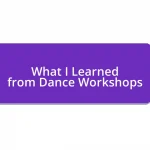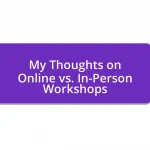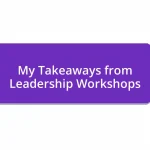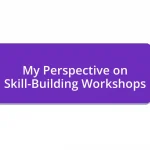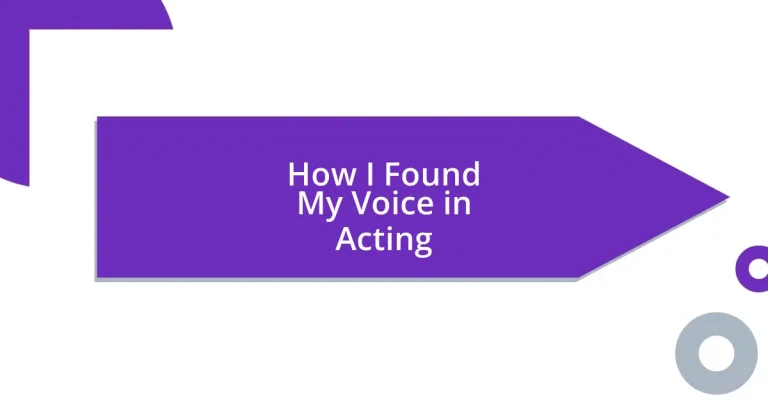Key takeaways:
- First stage experience ignited a passion for acting, blending personal exploration with storytelling.
- Overcoming self-doubt through preparation, vulnerability, and positive self-talk enhanced performance authenticity.
- Attending diverse acting classes fostered emotional connection and creative spontaneity, essential for finding one’s unique voice.
- Building confidence in auditions transformed them from tests into opportunities for authentic self-expression.
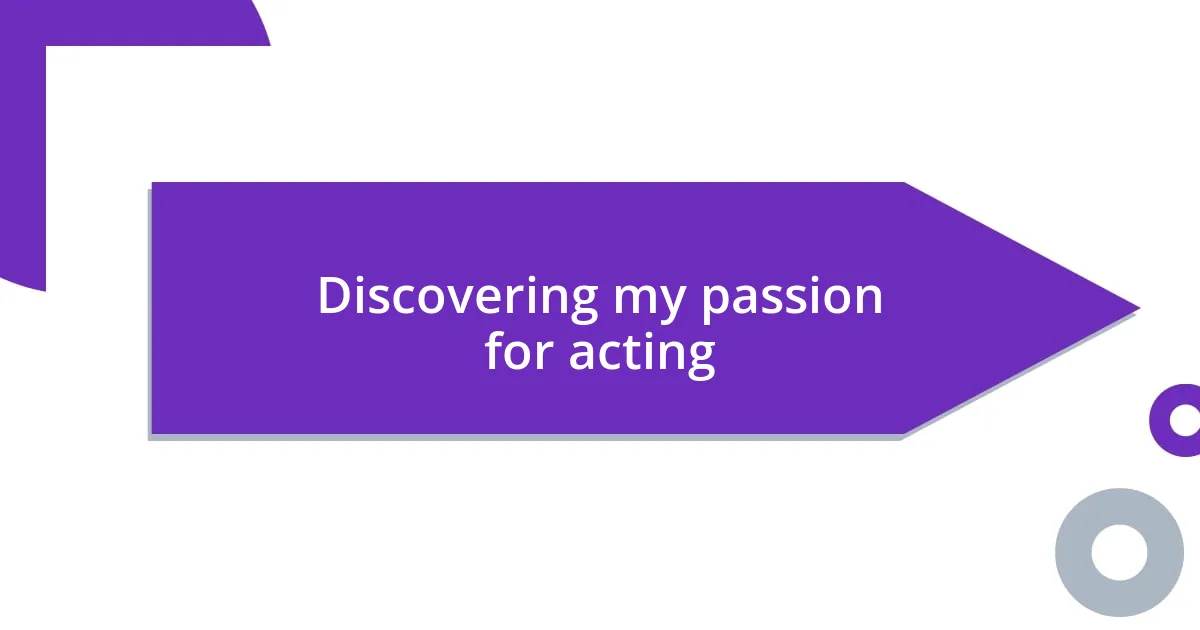
Discovering my passion for acting
I still remember the first time I stepped onto a stage. The lights were bright, and there was this electric buzz in the air. I felt a mix of excitement and fear; my heart raced as I delivered my lines. In that moment, everything clicked. Could this be my calling?
As I explored different roles, something inside me awakened. I recall transforming into a character that was nothing like me, and for the first time, I felt free. I realized I wasn’t just acting; I was tapping into something deeply personal. Was I simply pretending, or was I exposing parts of myself I never knew existed?
Through auditions and rehearsals, the joy of storytelling took over. It became clear that acting was more than just a hobby; it was a vital expression of who I was. I often found myself lost in characters, questioning how they navigated the world. Wasn’t it fascinating how acting could allow us to explore our own emotions through different lenses?
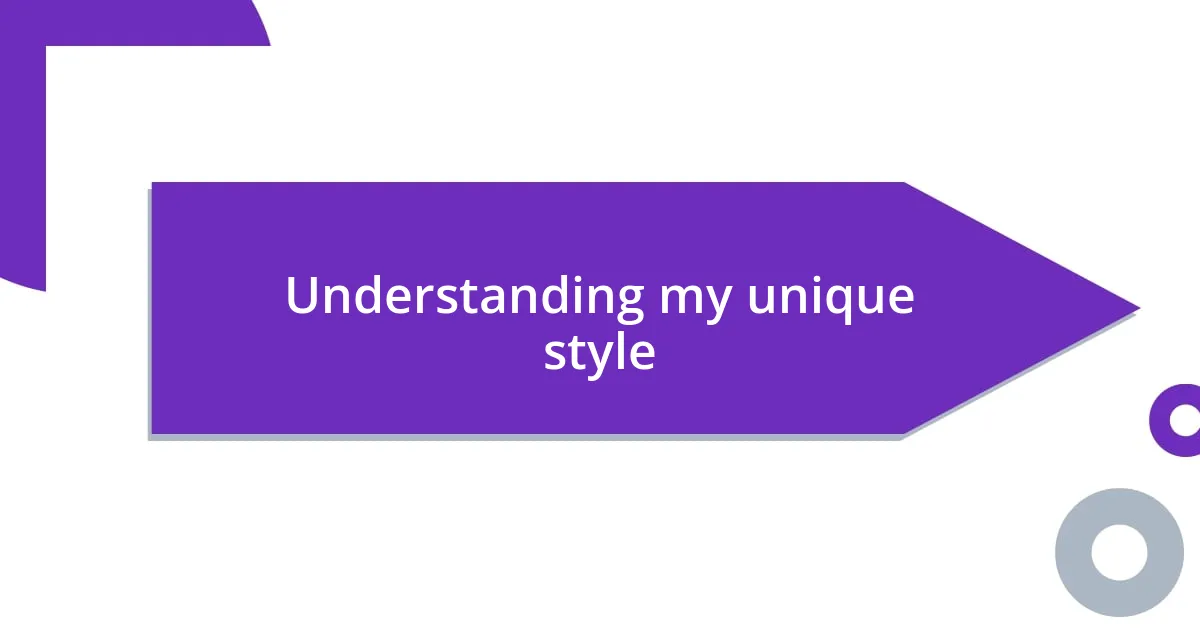
Understanding my unique style
Understanding my unique style involves a deep dive into my emotional landscape and the way I connect with characters. I’ve learned that every role requires me to tap into specific feelings, often related to my own experiences. For instance, during a dramatic scene where I portrayed a grieving mother, I instinctively recalled the loss of my beloved childhood pet. Channeling that raw heartache brought authenticity to my performance, and I realized how personal memories can shape my portrayal of a character’s journey.
- My unique style is driven by:
- Emotional authenticity: I strive to connect deeply with the character’s feelings.
- Physicality: I pay attention to how I move and use my body to reflect my character’s inner world.
- Vocal variety: I experiment with tone and pacing to differentiate characters and convey their emotions convincingly.
- Storytelling focus: I approach each role with a narrative mindset, seeking to understand how my character contributes to the broader story.
- Continuous exploration: I regularly challenge myself by exploring diverse genres, which helps refine my style and adaptability.
Every role I take on teaches me something new about my approach, making it a journey of self-discovery and expression.
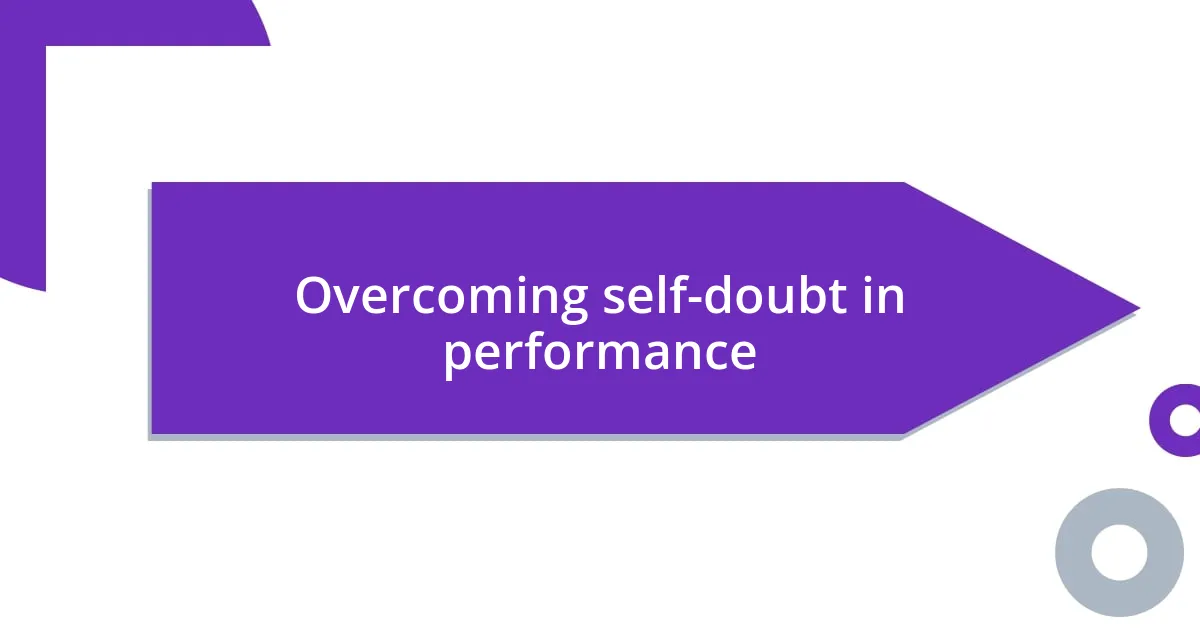
Overcoming self-doubt in performance
Overcoming self-doubt in performance is a journey I know all too well. I can recall a particular audition where my knees felt weak, and my palms were sweaty. It was for a role I desperately wanted, yet I stood before the casting director questioning if I was enough. That moment taught me the importance of preparation and self-acceptance. I began to understand that everyone experiences doubt, and acknowledging it is the first step to overcoming it.
On another occasion, while rehearsing for a play, I found myself struggling with a pivotal scene. I kept thinking about what others might think of my performance. It was overwhelming. Then, a fellow actor shared his own self-doubt struggles with me, revealing that even seasoned performers face such challenges. This conversation shifted my perspective. I realized that embracing vulnerability could enhance my performance, allowing me to connect more authentically with the audience.
Lastly, I practice positive self-talk before stepping on stage. It sounds simple, but I tell myself that I am capable and worthy to take up space. I focus on the story I am trying to tell rather than fixating on potential judgment. This mental shift diminishes my self-doubt and opens me up to greater creativity during my performances. Authenticity shines through when I let go of the pressure to be perfect.
| Self-Doubt Experience | Overcoming Strategy |
|---|---|
| Pre-Audition Anxiety | Preparation & Self-Acceptance |
| Pivotal Scene Struggle | Embracing Vulnerability |
| Performance Pressure | Positive Self-Talk |
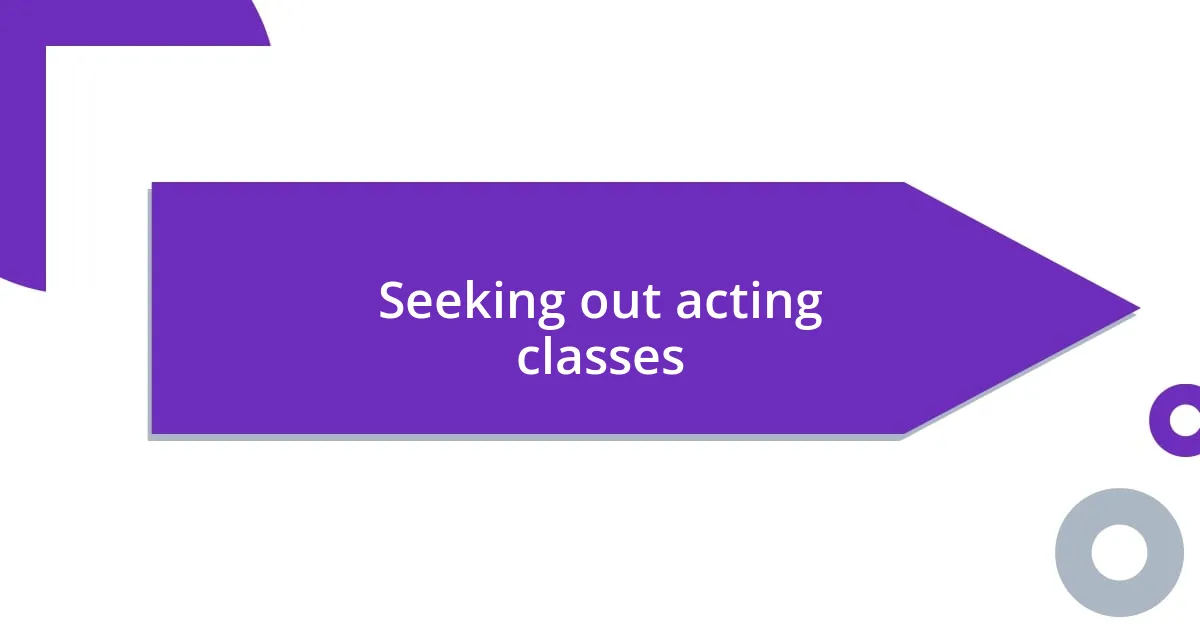
Seeking out acting classes
Finding the right acting classes was a transformative step for me. I remember scrolling through countless websites, trying to figure out which program would fit my needs. It felt overwhelming at times, but I followed my instinct and chose a class that emphasized emotional connection. That decision opened doors I didn’t even know existed.
During my first class, I could feel a swirl of excitement and nerves in my stomach. The instructor encouraged us to explore our own stories to inform our performances. I shared a poignant moment from my past—an experience that deeply shaped me. It was a revelation that sharing such personal insights could not only inform my acting but also create an authentic connection with my peers. I thought, how can acting feel so personal yet so liberating at the same time?
I soon discovered that diverse classes expanded my skill set beyond what I had imagined. I chose to dabble in improvisation, which pushed me out of my comfort zone. I remember one particular exercise where we paired up to create spontaneous scenes. The laughter and spontaneity that came from those sessions were exhilarating, reminding me that acting isn’t just about the script; it’s about the moments we create together. Seeking out those varied experiences truly shaped my unique voice in acting.
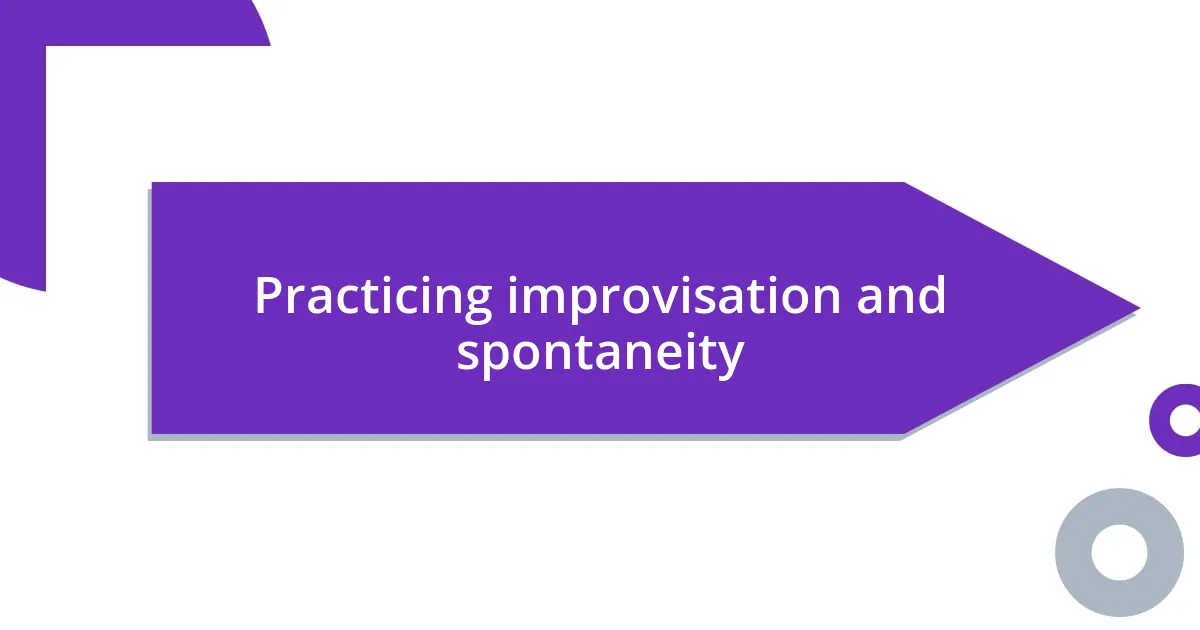
Practicing improvisation and spontaneity
Practicing improvisation has been one of the most freeing experiences in my acting journey. I remember stumbling into an improv workshop, not entirely sure of what to expect. The first exercise had us pair up and create spontaneous dialogues based on random prompts. I felt my heart race, but then laughter erupted as we both went off-script—turning the cards of spontaneity into something hilarious and unexpected. It was in those moments of unplanned creativity that I truly felt my voice begin to emerge.
I’ve often asked myself, “What happens when I let go of control?”. In one particular exercise, I had to play a character who was utterly different from myself—a flamboyant chef, for instance. I initially felt ridiculous and self-conscious, but as I embraced the absurdity, I rediscovered joy in performance. The laughter from my classmates encouraged me to take bolder choices, leading to a deeper connection with the material and my fellow actors. It’s incredible how stepping outside your comfort zone can empower you to find your authentic voice.
Improvisation also taught me about failure in a way that felt safe and liberating. I recall a scene where I completely blanked and blurted out a line that made no sense at all. To my surprise, it turned into a running joke amongst the group. Rather than feeling embarrassed, I learned to laugh at myself, understanding that these missteps can often lead to the most memorable moments. Such experiences have enriched my understanding of spontaneity and how it weaves beautifully into storytelling. That’s where the magic truly lies—finding joy in unpredictability and embracing the journey of authenticity in acting.
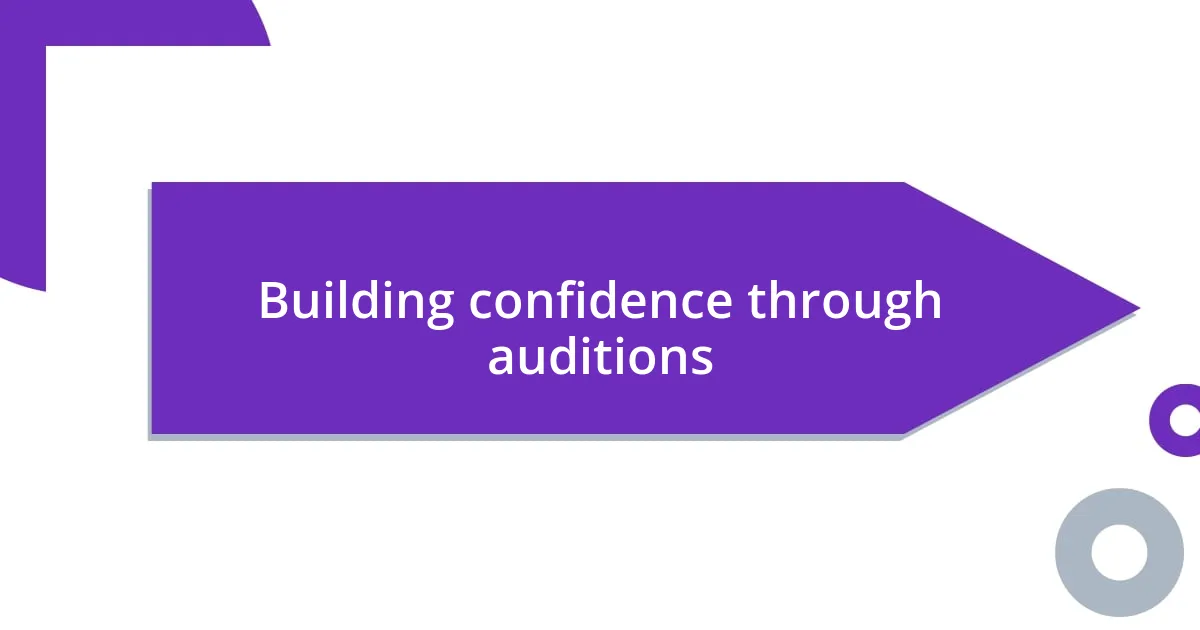
Building confidence through auditions
Building confidence through auditions is a pivotal moment in any actor’s journey. I remember my first audition vividly; my palms were sweaty, and my heart pounded. Walking into that room felt like stepping onto a stage for the first time. But what I learned was that every audition, regardless of the outcome, was a chance to learn and grow—like a rehearsal for life.
In the early days, I was often caught in a whirlwind of self-doubt. I asked myself, “What if I mess up? What if they don’t like me?” But over time, I flipped that narrative. I started to view auditions not just as a test but as an opportunity to explore new characters. Each time I stepped in front of the panel, I reminded myself that this was my moment to shine. It became a dance of vulnerability and strength, where I let my true self peek through even just for a few minutes.
One memorable audition was for a role that felt miles away from who I was. I remember standing in front of the mirror, practicing my monologue, and thinking, “What would it feel like to step into their shoes?” That perspective shift transformed my nerves into an invigorating rush. When I finally delivered my lines, it felt like I was no longer auditioning but sharing a part of my soul. It was in those moments that I discovered confidence doesn’t always come from the perfect performance; it often blossoms from the courage to be authentic, raw, and undeniably yourself.
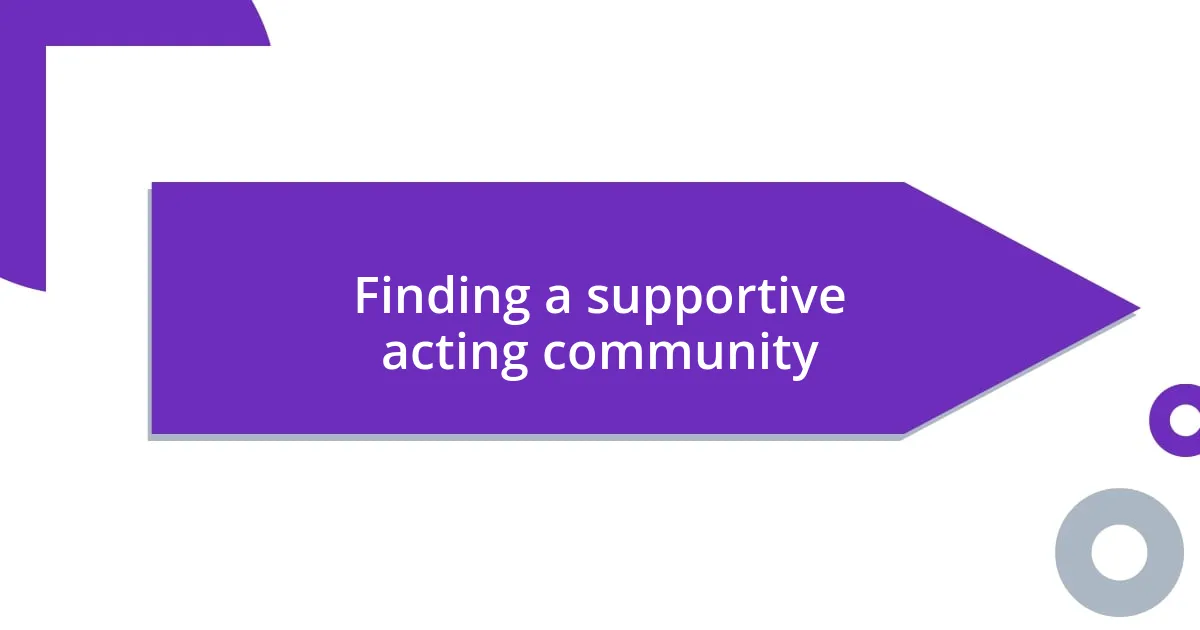
Finding a supportive acting community
Finding a supportive acting community has been crucial in my journey as an actor. I vividly recall the day I joined my first acting class; walking in, I was flooded with a mixture of excitement and trepidation. To my relief, I was greeted by a warm group who shared their own vulnerabilities. It felt like stepping into a cozy embrace, where everyone was there to uplift and inspire each other.
One evening, during a rehearsal, I remember feeling particularly vulnerable while sharing my work. I had shared a scene that I was emotionally connected to, and to my surprise, my peers rallied around me with encouragement. “We resonate with your choices—keep going!” they cheered. It was such a powerful moment that reinforced the importance of having a nurturing circle. I began to realize that this environment wasn’t just about performing; it was about connecting, sharing, and growing together.
I often reflect, “How would I have grown without such camaraderie?” I truly believe that the support I found in my acting community allowed me to experiment without fear. When I saw others also embracing their quirks and imperfections, it encouraged me to do the same. This mutual encouragement nurtured my growth and opened doors to friends and collaborators who challenge and inspire me every day as an actor.

